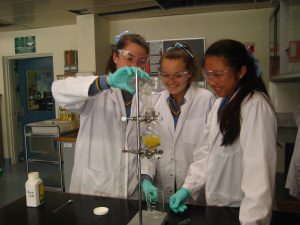From the Head of Science
 Science classes have commenced in the midst of the new Science building refurbishment. Students are engaged in learning activities in the new general Science laboratories and look forward to the completion of the advanced VCE Science laboratories.
Science classes have commenced in the midst of the new Science building refurbishment. Students are engaged in learning activities in the new general Science laboratories and look forward to the completion of the advanced VCE Science laboratories.
Science students previously required a long work bench and a desk. This paradigm is giving way to a model where shared common space is the priority for student teams that increasingly collaborate and share resources. The new VCE laboratories will provide a specific space for students to work collaboratively whilst completing design investigations that incorporate a variety of technologies including data logging and robotics.
Despite the redevelopment project, staff are ensuring laboratory investigations are organised in a safe and engaging environment. Practical investigations provide an exciting opportunity for students to explore their interests and scientific understanding through guided, real-world inquiry, essential to the presentation of Science.
The new year has seen the Science Faculty welcome Mr Stephen Brown to VCE Physics and General Science. Science teachers have developed a range of activities to enable students to engage in critical and creative thinking. Different methods of scientific inquiry that generate primary data will be utilised by students to solve scientific problems. VCE Biology students are currently investigating the effect of heat, pH, enzyme concentration and surface area on the production oxygen from hydrogen peroxide using the enzyme catalase. Students will use sensors to measure oxygen levels electronically. Whilst the VCE Chemistry students are preparing biodiesels from vegetable oils, such as canola, sunflower and olive oil. Students will purify the biodiesel and determine the available energy per gram.
As part of the Science Faculty’s commitment to co-curricular activities, students will be encouraged to accept invitations to participate in exciting and unique activities throughout 2018. This includes programs such as the Chemistry Olympiad Training Program at Melbourne University and competitions such as the Big Science Competition.
These activities will cultivate and encourage our students’ scientific minds. Years 7 and 8 teachers have commenced training for the Big Science Competition using various online platforms to engage students and enhance their skills for analysis and critical thinking with data. Additionally, the Year 8 Science Honours Program Simple Machines and Hydraulics has begun and the Year 7 Science Honours Program will commence in Term 2. Scientific investigations commence across the Year levels which will assist students in their understanding of scientific method and design, so they can become more critical thinkers in relation to scientific research.


